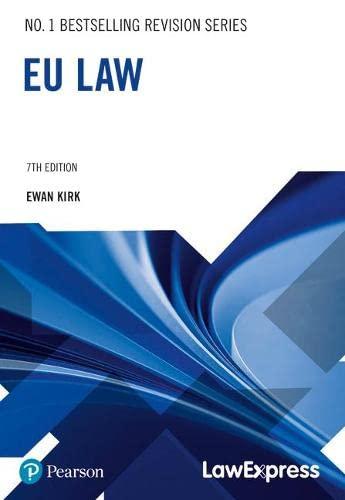Question
The state of California adopts a law banning advertising for all pesticides. The statute is immediately challenged by pesticide makers. The state argues that the
The state of California adopts a law banning advertising for all pesticides. The statute is immediately challenged by pesticide makers. The state argues that the use of such products by homeowners and others is causing a serious pollution problem in the state's streams and rivers, and is killing fish and other marine species. State biologists have produced a report that proves that nearly 30 percent of all fish killed in rivers and streams die from pesticide poisoning. The state argues that while it cannot ban the use of the chemicals, if they are not advertised the sale of pesticides will surely drop substantially, and this will help the water pollution problem. Pesticide makers admit that the runoff of chemical pesticides does cause a problem in some streams and rivers, but they argue that most pesticides (55 percent) sold today are not harmful to anyone, including fish. Thirty percent of all pesticides sold are not even made from chemicals but are produced from natural substances. Finally, they say the state has not produced any studies to show that a ban on advertising will reduce the use of pesticides. In other states where this was tried, sales remained unchanged, they said. Pesticide makers argue that the law violates the First Amendment. a. Outline the test the court will use to evaluate whether or not this new law is constitutional. b. Apply this test to the pesticide law and determine whether the state could constitutionally ban the advertising of all pesticides.
Step by Step Solution
There are 3 Steps involved in it
Step: 1

Get Instant Access to Expert-Tailored Solutions
See step-by-step solutions with expert insights and AI powered tools for academic success
Step: 2

Step: 3

Ace Your Homework with AI
Get the answers you need in no time with our AI-driven, step-by-step assistance
Get Started


